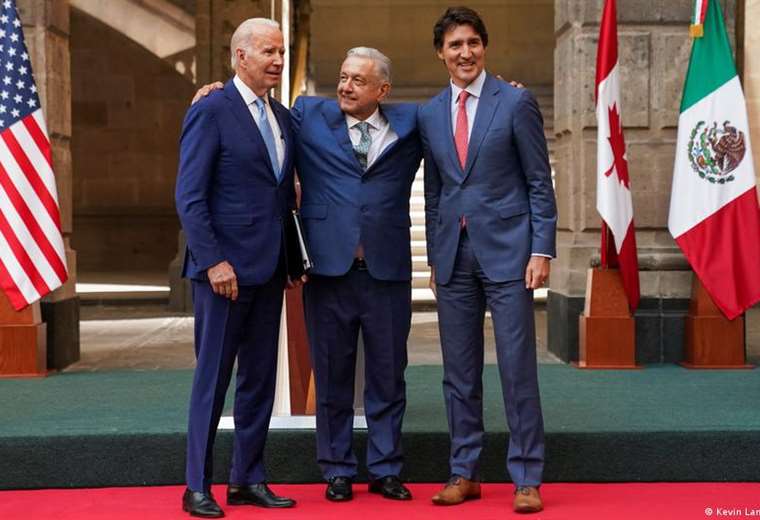January 12, 2023, 4:15 PM
January 12, 2023, 4:15 PM
The North American summit, from January 9 to 11, 2023, will perhaps be remembered as the moment when Mexico, Canada and the United States —presenting themselves as “three friends”— closed ranks in the face of the Chinese challenge and deepened the integration of its geopolitical zone, foresee the experts consulted by DW.
“It’s a kind of New Deal that breaks standards,” says Ignacio Martínez Cortés, Coordinator of the Laboratory for Analysis of Commerce, Economy and Business (LACEN) at the Autonomous University of Mexico (UNAM). For Lila Abed, deputy director of the Wilson Center’s Mexico Institute, the summit marks the “return to regionalism” and opens up new opportunities for Mexico.
An outline of a new world order
“The President of the United States, Joe Biden, talked about supply chains—businessmen call it nearshoring—; the Mexican president, Andrés Manuel López Obrador, spoke of import substitution,” says Martínez. But, in practice, all this means the same thing: “Mexico will play a strategic role so that it is the guarantor that, in the future, no production processes in the region are interrupted”, writes the journalist Raymundo Riva Palacio in the specialized newspaper The financial.
Beyond the recomposition of global trade, this also implies a geopolitical offensive against China. “The United States intends to return to being the cradle of technological development and seeks a new phase of growth that combines sustainable development and security,” observes Martínez, an expert on China. And the main instrument will be the TMEC, the free trade agreement that unites Mexico, the US and Canada since 1994.
Boosting competitiveness and clean energy
But what is new about this summit? Perhaps not so much the details, but for the first time security, economy, environment and migration were addressed jointly. That is why the meeting was a great boost to the overall competitiveness of the region, Abed emphasizes. And he highlights various agreements such as “strengthening investment in the semiconductor industry to reduce dependence on Asia, and the mapping of lithium and critical minerals essential for the energy transition.”
Riva Palacio, for his part, refers to “a series of ambitious, rapid and coordinated measures to build economies that are driven by clean energy and that respond to climate change.” And he mentions that these include “reducing methane emissions by at least 15 percent by 2030 from 2020 levels.”
Cybersecurity and espionage
A novel topic was cybersecurity, on which a special dialogue group was created. “Although it is not expressly stated, that means Mexico’s approach to the Five Eyes system,” says Martínez, referring to the intelligence and espionage alliance known as FVEY, which until now includes Australia, Canada, New Zealand, the United Kingdom and USA.
Mexico, the target of several cyberattacks such as that of the Guacamaya group against the Armed Forces last year, put aside its reluctance, probably “to contain the technological avalanche that China is preparing from 2025,” says this China expert from UNAM.
Order migration and train workers
There was also progress towards orderly migration to foster competitiveness, at a time when Canada and the United States face the double challenges of a migration flood and, at the same time, a shortage of skilled labor.
Recently, Biden announced a drastic change, forcing migrants from Venezuela, Cuba, Nicaragua and Haiti to apply from their countries of origin, if they do not want to be immediately deported when they step on American soil. This helped to substantially lower the migratory flow, said the Mexican president. Mexico will support this strategy by building a large migration center in the South, to facilitate documented migration and curb human trafficking.
At the same time, a new student mobility project was created to train the leaders and technicians of the 21st century. That opens opportunities for young Mexicans. However, it leaves out the rest of Latin America, something that López Obrador demanded of Biden during the summit, speaking of “abandonment.” But, beyond his rhetoric, the vision of his partners to turn North America into a bastion to face global competition from China prevailed.







